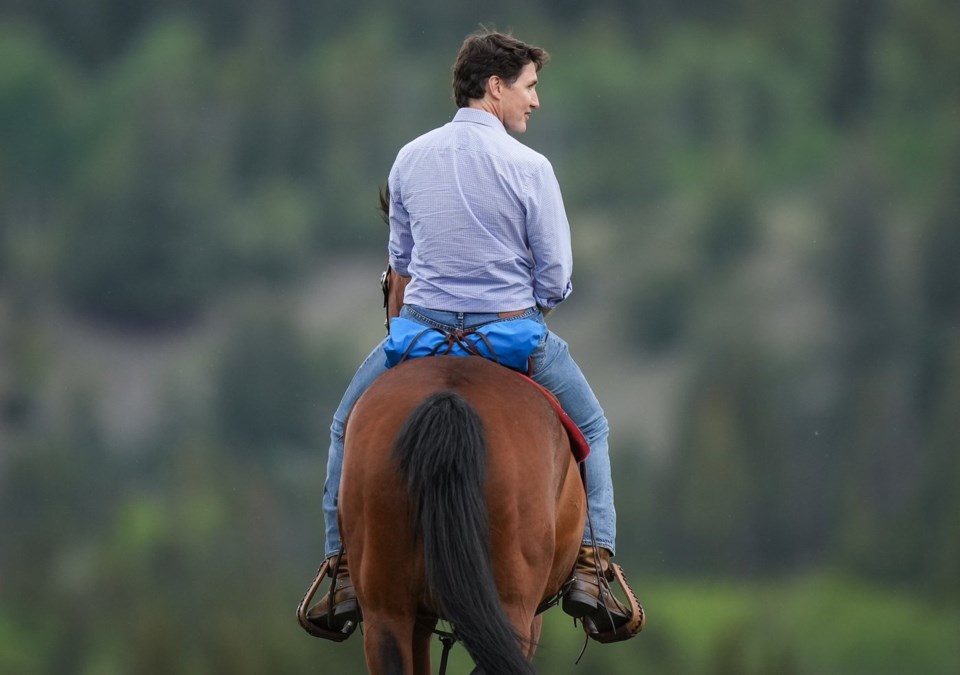OTTAWA ÔÇö A string of Liberal cabinet ministers declared theyÔÇÖre ready to get back in the saddle after this weekÔÇÖs crushing byelection defeat, though some suggest they have blinders on.
With the summer barbecue circuit beckoning, members of Prime Minister Justin Trudeau's cabinet fanned out across the country to let Canadians know about work they've been doing on their files.
But every minister that stepped up to a microphone was bombarded with questions about their government's fading political prospects after losing the byelection in what was considered a safe Toronto riding to the Conservatives.
Voters sent the Liberals a message they can't ignore, Immigration Minister Marc Miller said at a press conference Wednesday in Montreal, adding the party needs to hear people out and "get back on the horse."
"We need to listen to the people that voted in the way they voted, screw our heads on better and then move on."
During a visit to sa╣·╝╩┤½├¢, it appeared Trudeau took Miller's metaphor literally when he went horseback riding at a community event to mark the 10th anniversary of the Supreme Court's Tsilhqot'in decision. For the second day in a row since the byelection defeat, Trudeau avoided taking media questions.
Miller said Conservative Leader Pierre Poilievre is "weaponizing" frustrations Canadians have with the Liberals ÔÇö concerns that have noting to do with how they feel about the official Opposition.
"He reminds me of a wrestling manager from the '80s, just yelling slogans ... and everyone likes to boo or to cheer. I don't know why this has become the state of Canadian politics, but that's the reality of what I see," Miller said.
"It's not a WWF match, this is reality. Canadians are suffering and we need to fight for them."
Ministers who spoke Wednesday declared Trudeau the best person to lead the Liberals into the next election against Poilievre, despite the prime minister's low personal polling numbers.
"He has my complete confidence and my appreciation regarding his leadership role in the party and in the government," Procurement Minister Jean-Yves Duclos said Wednesday in Quebec City.
He went as far as to say Trudeau will lead the Liberals to another election victory in 2025.
Although the ministers expressed openness to hearing out Canadians turned off by the Liberals and their leader, none could say exactly how their team plans to address those concerns.
"It starts by listening, and starts by showing up in communities," said Addictions Minister Ya'ara Saks, who was in Cape Breton to announce funding to reduce substance abuse.
The comments reflect those of the prime minister Tuesday, who said he has heard the concerns and frustrations of voters and clearly had more work to do to deliver tangible results for Canadians.
That message is slightly tone deaf, said Andrew Perez, a Liberal strategist with Perez Strategies.
"It's a bit late for listening at this point," Perez said Wednesday.
"The results of the stunning political upset in Toronto-St. Paul's is yet another proof point in terms of the inability of the government to really listen to what Canadians are saying, and pivot  It's a bit late in the game to say that we're now going to start listening."
The Conservatives accused the Liberals of blaming others for their own failures.
"The Trudeau Liberals learn nothing," Poilievre spokesperson Sebastian Skamski said in a statement.
"Justin TrudeauÔÇÖs answer was to double down on his failed policies that have brought him to this point."
Speaking to CBC News on Tuesday, Karina Gould, on parental leave from her government House leader post, said the byelection was a "wake-up call," for her party, but added the caucus needs time to reflect before detailing what changes might need to happen.
"What's clear about yesterday's result is that we hope to do things differently," said Gould, who also serves as co-chair for the Liberal campaign in Ontario.
Environment Minister Steven Guilbeault took a different tack than his colleagues and suggested the party needs to do more talking, as opposed to listening.
"We need to continue showing Canadians that we're there for them," he said.
"Right now, clearly some of them either don't believe that, or they don't see it, and I think we need to do a better job at communicating what we're doing to help them."
The next election is slated to take place by October 2025, and things could change for Canadians before then, Guilbeault said.
"In the coming months, for many of them, the situation will improve, partly because of things we're doing," he said.
"The more Canadians can see the benefits of what we're doing and what and how we're working for them, the more the situation could change."
This report by The Canadian Press was first published June 26, 2024.
Laura Osman and Stephanie Taylor, The Canadian Press



